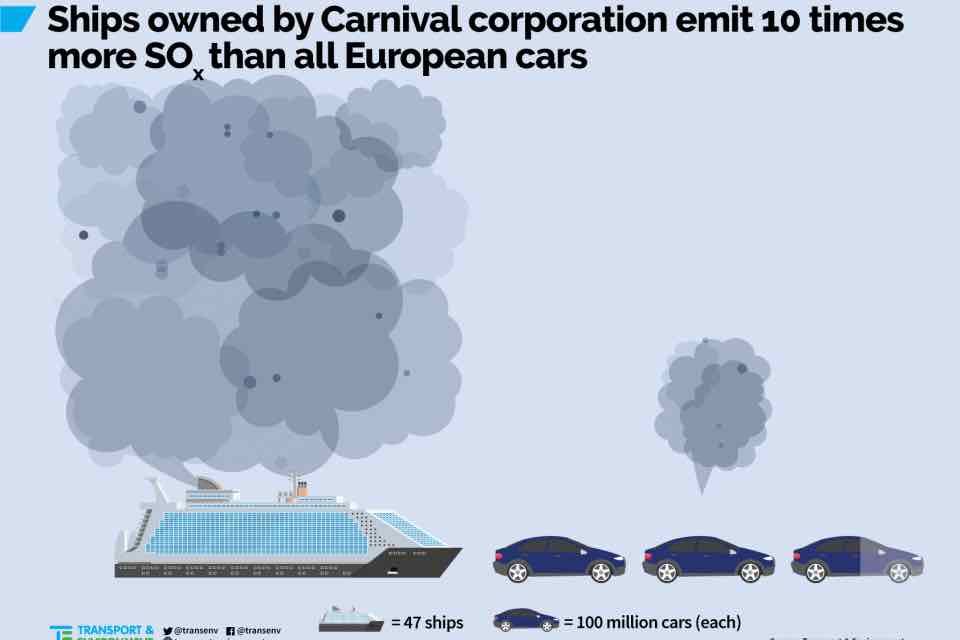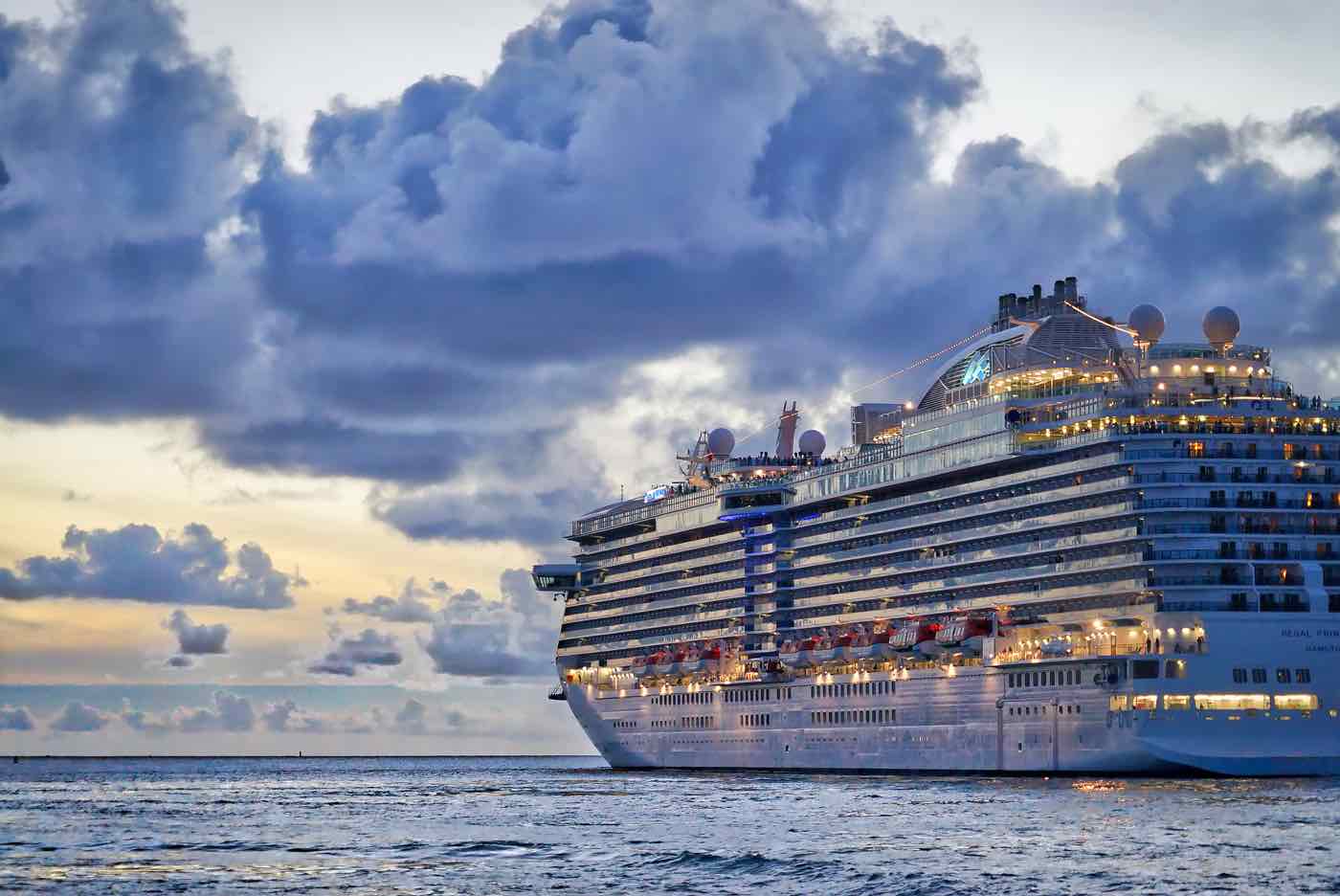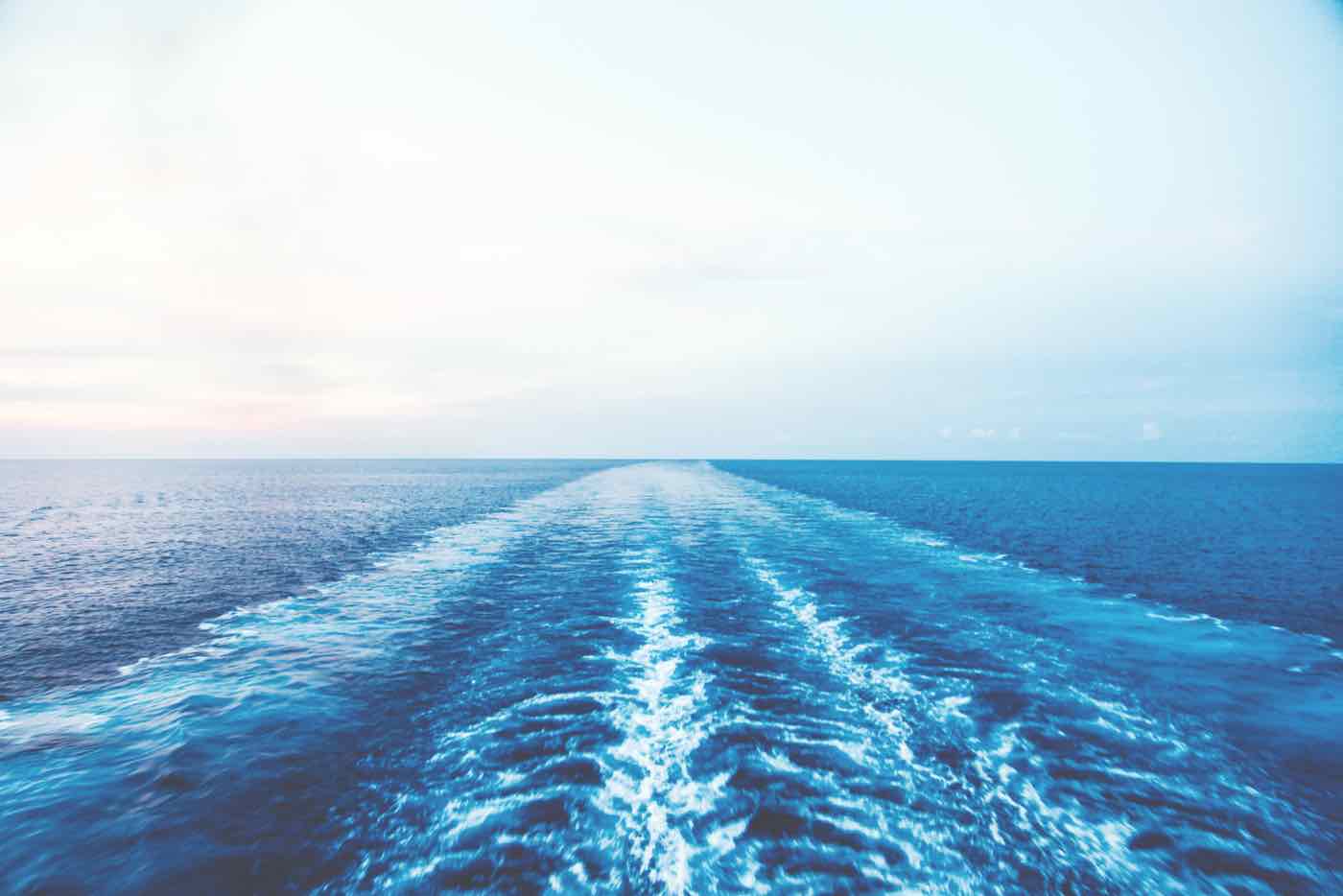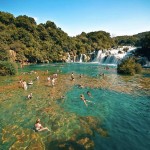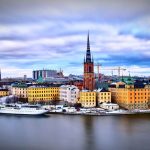It’s time to talk about cruise ship pollution. There’s no denying one of the worst offenders to the planet is the travel industry. And with numbers of tourism breaking records year after year, it’s nothing but a growing problem.
Fortunately, we can – and should – make smart choices about the way we travel.
Out of all the choices we can do for our vacations, one of the WORST ones we can do is take a cruise ship.
These ocean-going titans emit mind-bending quantities of carcinogenic air pollution. Not only this, but they are operated by cantankerous corporations who are willing to cut dangerous corners. Don’t believe me? Read on.
Setting Sail on A Cruise Ship
Let me start by saying that on a personal level, I don’t understand the appeal of cruise ships. Being stuck on a floating block of cells with thousands of strangers and spend the day eating, drinking, and standing in long lines with limited time to escape to see new places is my definition of prison. Or hell.
But hey, each to his own. I don’t care about how people choose to spend their free time and I wouldn’t even write about it if they were harmless.
The problem is that they aren’t. I do start to care when I see the harm these corporations do to our environment. The scale of their actions is massive – much bigger than mine, yours or all of us combined – and no one seems to care.
When I read this, my jaw dropped
Taking a cruise ship is one the most capitalist and environmental-damaging choice we can make.
Why? Because of things like this.
In 2017, Carnival Corporation, the world’s biggest operator of luxury cruises, emitted more sulphur dioxide (SOx) around Europe’s coasts than all of Europe’s cars MULTIPLIED BY TEN (10). That’s 10x more than all the cars in the EU plus Norway, Iceland, Montenegro and Greenland.
Cruise ships were supposed to be safe. From guilt, noise and, dare I say it, pollution—secular cloisters where you can hide away, immune to the goings-on of the big bad world and the angst that is a by-product of being alive—where you can tuck into a bottomless shrimp buffet while floating on the serene azure, without a care in the world.
Well, wrong. Cruise ship pollution is off the charts in all its shapes and forms: waste, sewage, air, and visual pollution.
And that’s why I feel the right to share how vicious they can be in harming our planet. Even if I’m not a role model in terms of environmental practices at an individual level, there are worse – much worse – offenders out there that need to be stopped.
Particle Emissions: It’s All Out There In The Air
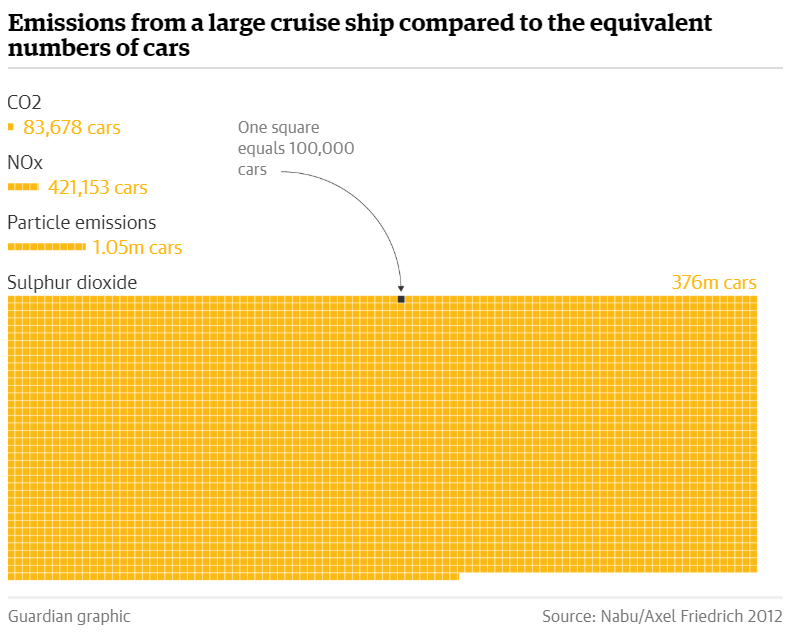
Source: The Guardian.
Cruise ships create pollution problems as supersized as themselves. Every single day, cruise ships worldwide emit the same particular matter as a million cars.
A single large cruise ship will emit over five tonnes of NOX emissions, and 450kg of ultrafine particles a day. To give you an idea, it emits about the same amount of sulfur dioxide as 3,6 MILLION cars.
Cruise ship vs airplane pollution
Surprise, surprise – in relative numbers, setting sail on a cruise ship is also a lot worse than taking a flight.
Research shows that cruising emits up to four times more CO2 per passenger than flying.
While air travel costs between 0,11 and 0,16 kg per passenger per kilometer – a significant amount -, taking a cruise ship adds up to a staggering 0,40 kilograms per kilometer.
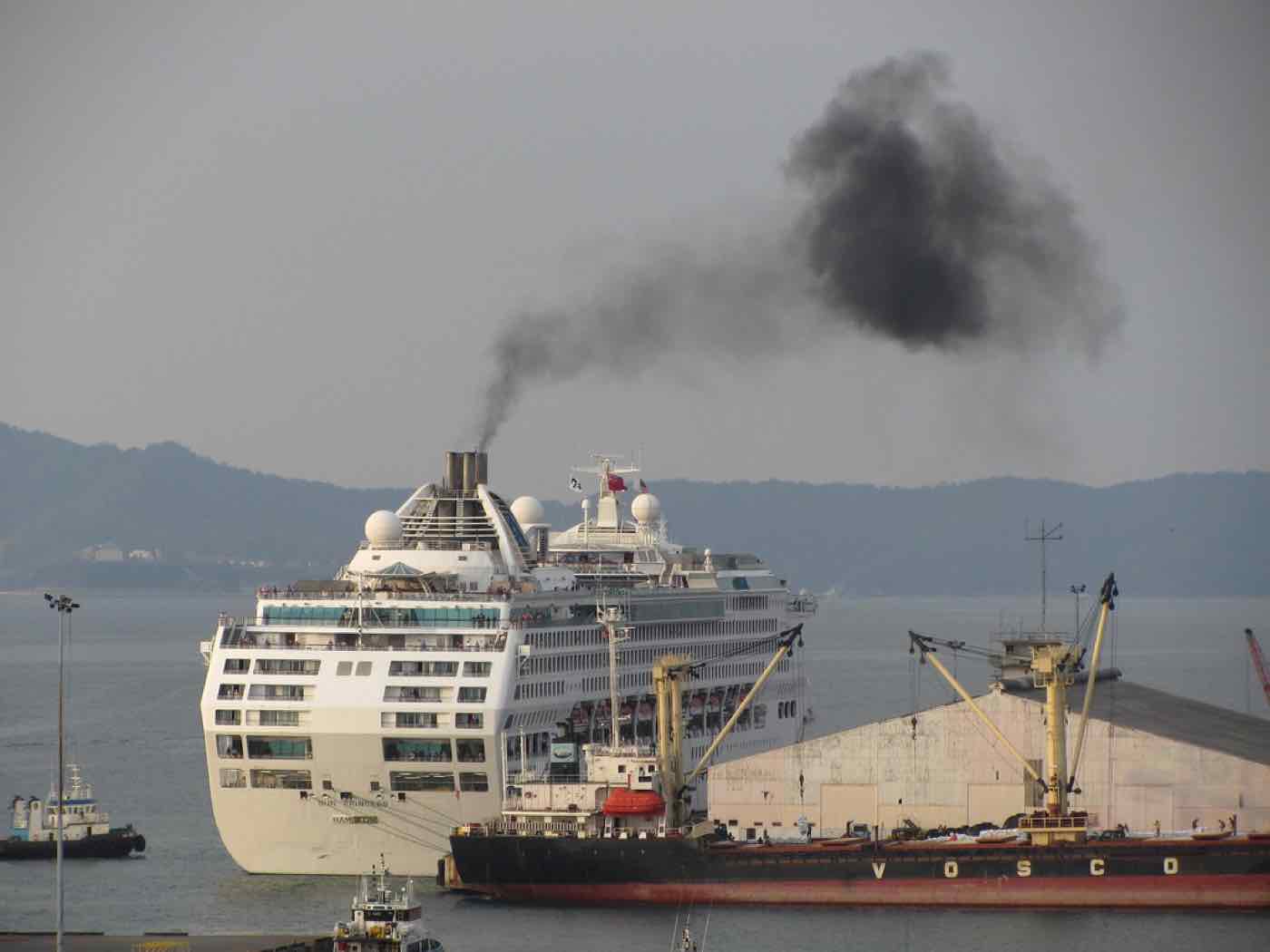
Sewage: Shall We Talk About It? No, I Don’t Want To Either But It’s Important
Just how much sewage do 3,000 people produce in a week? It’s almost 800 cubic metres. And there’s a bunch of other gross waste products as well. Here it is, broken down for you:
- Graywater: This is non-biological waste fluid from kitchens, sinks, showers and cleaning. Not the worst, but certainly quite icky.
- Blackwater: The actual human waste. Given the quantity of shrimp consumed per day on an average cruise liner, very icky indeed.
- Solid waste: These are the kind of items you might try to recycle at home, but which are typically incinerated on a cruise ship—cardboard, plastics, cans and glass. Where does the incineration ash go? Oh yeah, into the ocean.
There are also various hazardous wastes produced by onboard activities like photo processing, equipment cleaning, and dry cleaning. Finally, there is bilge water and ballast water, both of which contain pollutants of varying levels of toxicity.
Where does all this go? You guessed it… The only regulation for a cruise ship to dump the sewage is to be three nautical miles from the shore. This can easily contaminate sensitive ocean waters where marine life thrives and where even swimmers go for their holidays (yes this happened in Brazil and people got sick).
Waste: OK, what happens to the waste really?
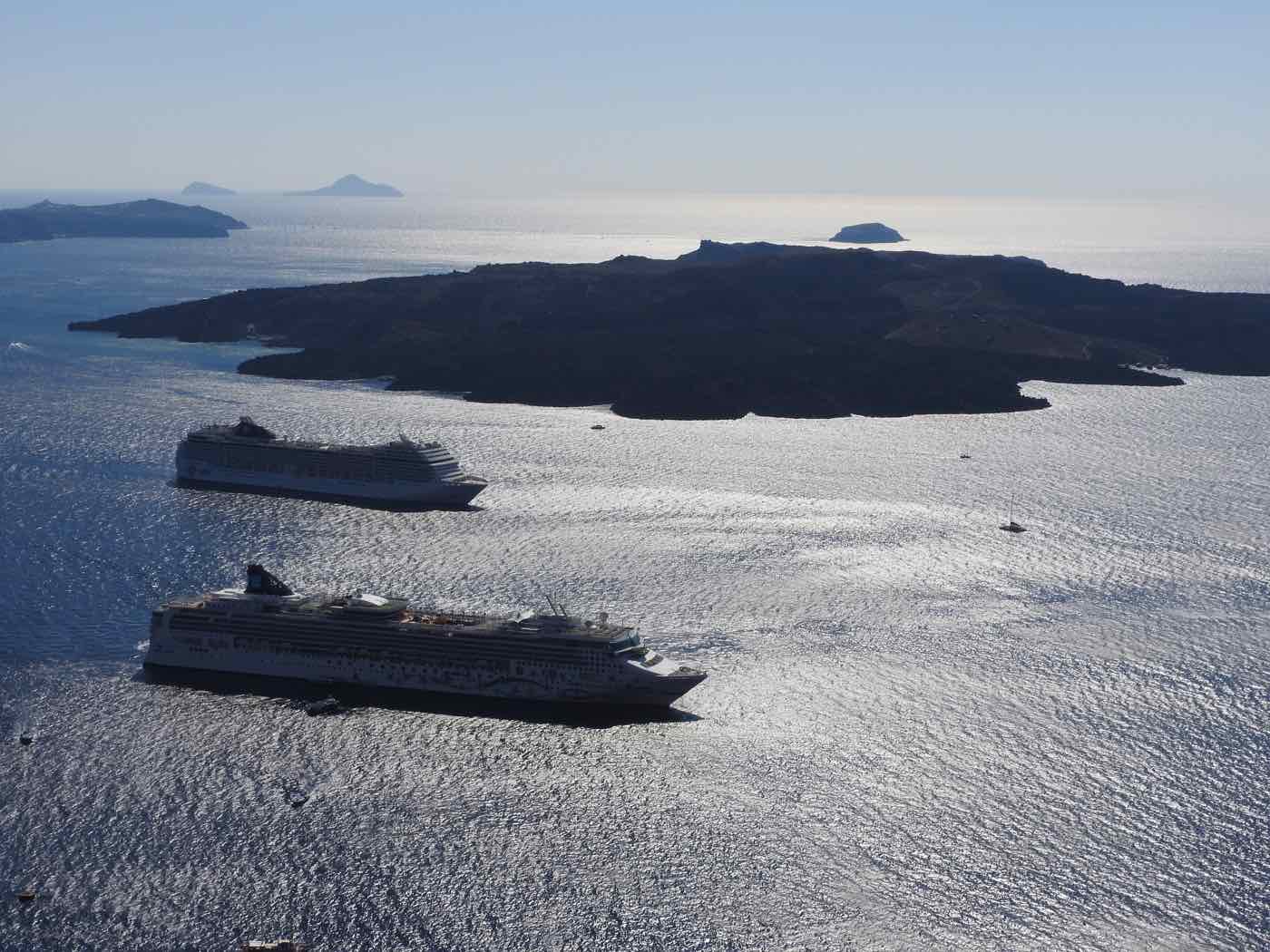
Waste is supposed to be treated – separated and sterilized – before being incinerated (if it’s solid) or put into the ocean (if it’s liquid). The only problem is, obviously, these cruise liners are operated by giant corporations, which want to make as much money as possible. So, they cut corners. There does seem to be a running theme, here.
Several cruise lines have been charged with releasing thousands of gallons of oily waste or graywater straight into the ocean.
One of the worst cruise operators for the environment in 2019, Carnival Cruise Lines has racked up fines of $60 million for conspiracy and obstruction of justice, and even lying to the US Coast Guard about secretly discharging huge amounts of oil, waste, and plastics into the sea. There are video evidence for everyone out there to see.
Shockingly, it is not uncommon for cruise ships to fail sanitation inspections as well. Again, Carnival Cruise Lines in particular has a bit of a reputation. Its ships Liberty, Vista, Breeze, and Triumph have all been found deficient on various counts in recent years. In July 2019, United States Public Health gave the Carnival Fantasy a score of just 77 – the lowest score in its already patchy 30-year history. For the record, anything below 86 is deemed unsatisfactory.
The report found a mysterious brown fluid running from the showers to the ship’s medical facility; high levels of chlorine in the ship’s recreational water facilities; bagels and bread covered in flies in the salad bar; improperly sanitised food equipment; something they called a “visible film on top of the water” of the main swimming pool (erm… what?).
Oh and the ship also failed to comply with protocols relating to the containment of gastroenteritis!
Air Quality: A Rising Concern
Your carbon footprint approximately triples while cruising. Not only this – the air you breathe on the deck might be as bad as in the world’s most polluted cities.
The Brith TV show Dispatches went undercover and found that the air on the upper deck of Oceana was found to have 84,000 ultra-fine particulates per cubic centimetre. These numbers are only found in cities like Delhi or Shanghai and are more than double of London’s busy Piccadilly Circus intersection (had “just” 38,400 per cubic centimetre).
Ambient air pollution – a large portion of which is cruise ship pollution – shaves two years off the life expectancy of your average European.
The three port cities which bear the brunt of this air pollution are Barcelona (Spain), Palma de Mallorca (Spain) and Venice (Italy). Hey, who doesn’t love a glass of sangria at sunset, off the Mediterranean coast, while basking in a hot tub atop a GIANT SULPHUR DIOXIDE-EMITTING MEGALITH?
Visual Pollution: It’s Also Hurtful To The Eyes
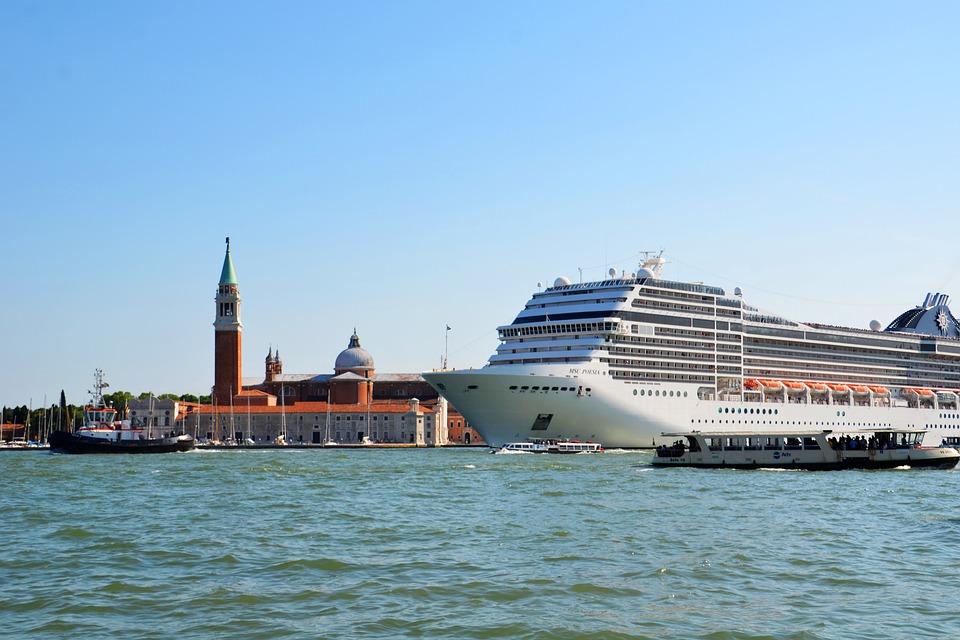
Finally, there’s a type of pollution that is hardly mentioned and almost impossible to be measured: visual pollution.
Who wants a massive floating city to literally invade ports of towns and islands and spoil the view? Makes me cringe. Just look at this series of photographs by Gianni Berengo Gardin. No wonder Venice has started to divert cruise ships to other ports.
A virtual tour of the Symphony of Seas is like a rollercoaster ride in its own right. This sea giant, launched in 2018, is the length of 30 double-decker buses—a sixth longer than The Shard. Its signature feature, an open-air garden aptly named Central Park, required extensive clay engineering. The ship is manned by a crew of 2,200 and it is much, much bigger than the Titanic.
Where else can you watch a West End-sized musical theatre production, play glow-in-the-dark laser tag, have a robot serving you cocktails and go ice skating, all while cruising at moderate speed in the Caribbean?
Why Are Cruise Ships So Polluting?
Firstly, they run on diesel engines, gas turbines, or both. They also frequently burn fuel oil, which contains 2,000 times as much sulfur oxides (SOx) as regular diesel. To be clear, SOx is carcinogenic, which is Greek for “really bad”. Burning diesel fuel also emits nitrogen oxide, which has been linked to lung cancer. Again, carcinogens = very bad.
Often, they run their engines in the harbor, to avoid paying shore-side taxes on electricity. Thus, they produce a smorgasbord of air pollutants simply by being.
It also produces sulfur which, if you mix it with water and air, makes sulphuric acid—bad—acid rain—bad. Why bad? Because it kills fish, coral, trees, dolphins… Basically, it harms just about anything that you can picture David Attenborough posing for a selfie with.
Why Don’t They Use Cleaner Fuel?
Simply put: cleaner fuel is more expensive, so cruise lines cheat.
They use scrubbers to wash the fuel, so that it passes regulations. While this does mean that the new, cleaner fuel meets environmental standards, the ships in question are using ‘open-loop scrubbers’, which discharge the pollutant waste (i.e., the sh*t they scrubbed off the dirty fuel) directly into the ocean, immediately after wiping it off the original fuel.
In other words, it does precisely jack-all to reduce the pollutant aspect of a cruise liner. Quite rightly, there has been a coordinated, international backlash against the use of these scrubbers in recent months.
As a result, several countries, including Norway, Ireland, Russia, Singapore, and China have banned the use of scrubbers in their waters, over fears of dangerous pollution. But international rules are not strictly enforced.
Cruise Ship Squeeze: The New Pirates of the Seven Seas
Dig deep into the industry that makes billions, but pays pennies, with a high cost to the planet too.
Wait, there’s more: Dirty Water And Air Is Just The Tip Of The Iceberg
For the sake of posterity, it is also important to note that cruise ships have a plethora of other unsavoury crosses to bear apart from blatant flouting of environmental laws . Other reported “incidents” include:
- Booze-fuelled violent brawls that resulted in severe injuries
- More than 500 sexual assaults of women and girls on Royal Caribbean ships since 2006
- On-board blazes
- Deliberate tax evasion by incorporating companies in foreign countries – I suggest reading Ross Klein’s “Cruise Ship Squeeze”
Cruise companies are also notorious for boycotting destinations that raise port charges. In 2004, Antigua and Barbuda raised it to $2.50 per head, which is still very low. The Florida-Caribean Cruise Associations’ members threatened to boycott the destination and, as a result, the ports backed down. It is flagrant corporate bullying.
They also invest in the ports they stop at, to reduce costs. For example, Royal Caribbean co-owns Belize’s Fort Street Tourism Village. While this cost them $18 million, it didn’t take long to make this money back on port charges.
How popular are cruise ships?
To fully grasp the scale of the problem, how big is the cruise ship industry?
Well, very. People love to cruise. Last year, over 26 million passengers set sail. Erm, alarm bells. That’s a heck ton of shrimp buffets needed to keep them all fed.
What’s more, projections show those numbers increasing. The setup of budget cruise liners opened the market to swathes of lower- and middle-income families and couples. With Princess Cruises, you can book 7 nights hopping from one Caribbean dreamland to another for just $509! That’s not an advert.
Granted, though, that is incredibly cheap. So who pays the cost? You guessed it – the oceans and skies. There are also sacrifices made by unwitting passengers, but more on that later.
With ever more passengers to take on board, the ships are getting bigger and bigger, and more and more polluting, to match the numbers.
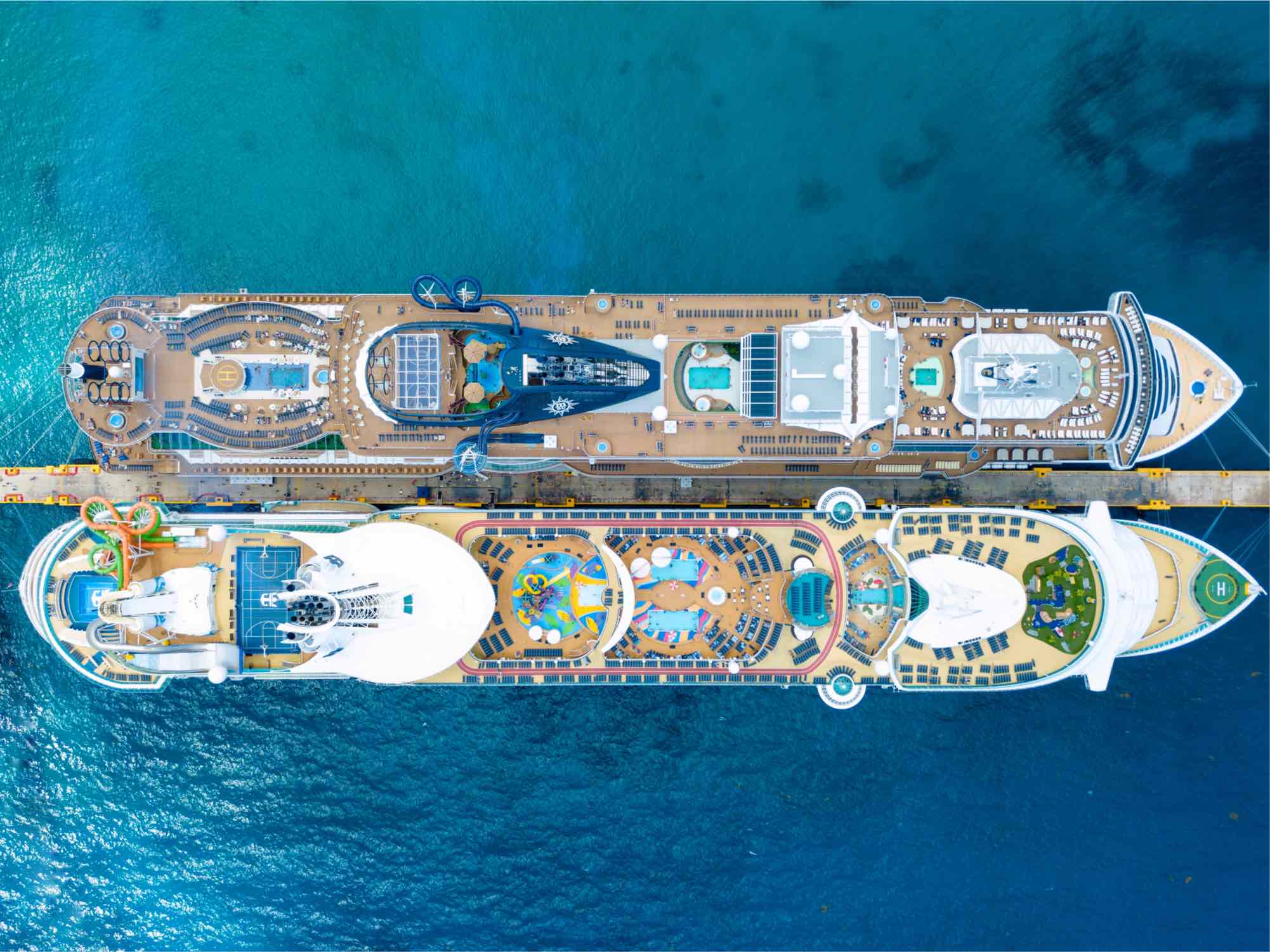
Ok, so how are we getting out of this mess?
Technology
First of all, the good news is that the technology already exists today to clean up the world’s cruise ships.
Battery technology is also coming on leaps and bounds, and could drastically change the way supertankers and cruise ships are powered. Batteries can already provide enough power to get smaller ships from A to B.
Using ‘closed-loop scrubbers’, would reduce cruise ship pollution significantly. They store the waste materials for treatment on land. If they do reach land, these substances are required, by law, to be disposed of only in specialist facilities, a disturbing indicator of just how potent they can be.
Other sources of energy, such as liquefied natural gas (LNG) and hydrogen could also be instrumental in the shift towards cleaner ocean-going vessels. Retrofitting, retrofitting, retrofitting. If you haven’t got #Retrofit tattooed on your forehead yet, do so now.
Taxes and regulations
In-port emissions can be cut if taxes are introduced on marine fossil fuels. At present, shore-side electricity falls under an EU directive which makes it cheaper for ships to burn their own fuel for electricity. Their fuel is dirty. Therefore, incentivizing cruise liners to plug into shore-side infrastructure might be a good start.
Finally, we need more strict and effective regulations.
When it comes to regulating the shipping industry, European law is hazy and fragmented. Ironically, the US coast is significantly more regulated. Its entire coastline is covered in sulfur emission controls, whereas in Europe it is only the North and Baltic Seas which enjoy the same protections. In the rest of the coast, lots of companies can just get away with it.
Common sense
It would help if cruise operators hold sewage and waste products on board and not simply dump it near sensitive coastal areas.
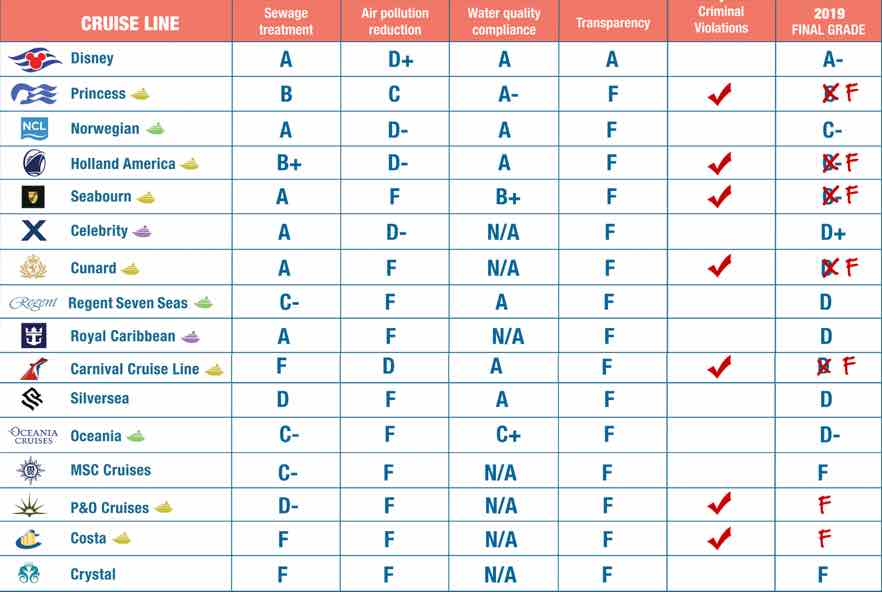
Source: Cruise Ship Report Card 2019, Friends of the Earth.
What can YOU do today?
Many European cities are banning diesel vehicles. Great! Some countries are banning the production of diesel vehicles. Even better. But the authorities of many coastal cities are letting cruise companies run riot in their skies and seas. They need to band together and fight for each other. For this to happen soon, they need public and governmental support.
But you can also have a say in this. Responsible tourism is all about taking ownership.
We all have the power of making conscious choices that can make a little less harmful to the planet. Supporting capitalist, lobbyist, heavy-polluting companies is FOR SURE not one of them.
These are some things you can do when considering taking a cruise ship.
- Prefer sustainable ways of travel. Go on a road trip. Use bus, trains or even ferries (basically non-luxury luxury cruise ships anyway!). Only use planes or cruise ships when needed.
- Choose your operator wisely. If you absolutely need to go on a cruise ship vacation, at the very least, research about the environmental practices of each company and ask how sustainable are their operations. Friends of the Earth release a cruise ship report card every year evaluating cruise operators on several environmental factors.
- Share this article. Awareness is the first step to solve any problem; the more people that know about this, the better and more pressure we can put on cruise ship companies.
When you are planning your next vacation, have all this in mind. Sure, cruise ships can be fun, relaxing, and even affordable – but hey, so can a road trip or backpacking in Southeast Asia. Are the grand gala dinners and water parks worth what they’re doing to our planet?
Our governments, at least, to a degree, reflect us. So get out there. Share this article, share your arguments, and consider not booking that next cruise. The cliché has never been more real and serious: we have no planet B.
Disclaimer: I’m Not Greta Thunberg
Because this is a hypocrisy-free space here, let me say this: no, I don’t have a carbon-free lifestyle by all means.
For one, I do travel a lot. Considering the dozens of trips I make per year alone, my carbon footprint is already much higher than the ordinary person. To make it worse, the fact this travel blog even exists ads an extra impact too. I’m very much aware that every day I’m contributing to make this global problem a tiny bit worse.
In case you’re interested, there are some things I do or don’t do, to reduce my negative impact on our delicate ecosystem.
- I’ve switched to a flexitarian diet and I’m eating much less meat.
- I recycle.
- I consume locally sourced products from local shops whenever possible.
- When possible, I switch my lights to energy-saving LEDs and always turn them off when not in use.
- And… I don’t have kids (this may seem controversial, but there are substantive rguments which show that this could be the most effective and long-lasting thing you can do as an individual – or couple! – to minimise your CO2 output).
I try to extend these environmentally-friendly practices to my travels too. I shop in local businesses. I take trains or buses as frequently as possible. And if I could go back in time, I probably would book a cruise in Halong Bay with a bit extra research on sustainability or even don’t go at all.
I’m aware that my actions contribute to pollute the planet – no doubt about it. But I’m mostly concerned about something that causes an impact of hundreds time more. Think of this as the 80/20 rule: let’s first tackle the things that are contributing to 80% of climate change impact. And guess what – it’s not me nor you. It’s them.
Have you taken a cruise before?
Where you aware of the amount of pollution cruise ships make every day?

